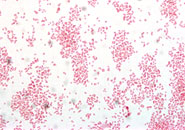Students assess pertussis impact on Urban School, ponder prevention tips

The pertussis virus. Photo by the Centers for Disease Control and Prevention/U.S. government work.
The initial shock of a pertussis outbreak earlier this spring has disappeared, but fear of catching the disease remains, Urban students say.
Pertussis is a highly contagious bacterial disease, caused by the throat bacterium Bordetella pertussis, according to WebMD.
Charlotte Worsley, assistant dean of student life, said there have been 11 reported cases of pertussis among students at Urban since the first case was reported in February.
Because the disease is so contagious, it was quickly spread around the Urban students who commute to school using the Marin bus twice a day. Among these students was Andrei Dolezal (’15), who was one of the first reported cases of pertussis.
“I know I wasn’t the first one to get it, but I did get it from the initial batch of kids who caught it,” he said.
Symptoms of pertussis start out as a common cold, including runny nose and a mild cough. However, in stage two of pertussis, these symptoms develop into a severe hacking cough, and sometimes people experience a whooping sound while coughing, hence the name “whooping cough.” Vomiting can also occur.
A pertussis cough can linger for up to three months, although the other symptoms go away.
“I actually still have pertussis. In China they call it the 100-day cough, and I think I got it about two months ago,” said Dolezal.
Along with the diagnosis of pertussis, Urban students also experienced teasing from other students. Every time a student would cough in class, the words “pertussis!” could be heard shouted from across the room. The outbreak even spawned a new pertussis-related vocabulary: Phrases like “don’t ‘pertuss’ me” and “you’ve been ‘pertussed’” have made their way into vernacular.
“(There was) lots of snickering, and friends freaking out if I tried to talk to them, even though I was not contagious when I got back to school,” said Dolezal.
Even Urban students who didn’t have the disease heard the remarks.
“I heard jokes about who started it,” said Andy Zhang (’17). “They were playful jokes, nothing harmful or anything.”
“People were blaming certain people for starting the cough,” said Colin Riley (’16). “And now whenever anyone coughs people say ‘pertussis!’”
Pertussis took an academic toll as well as a medical one. Dolezal missed five days of school and the junior trip to Joshua Tree.
“Missing so much school and being at school while sick during junior year is a pretty brutal situation,” he said.
Not only did the disease affect school life, but daily life in general. “Pertussis pretty much crippled my lungs so I couldn’t run or lift without gagging,” Dolezal said. “I lost 10 pounds, and just walking up the stairs caused heavy breathing.”
But perhaps the worst symptom of the pertussis scare was fear. Many students darted through hallways, paranoid about catching the disease.
“I was worried about getting it because so many people had it and it is contagious,” said Cory Smith (’16). “I actually got a cold and went to the doctor to get tested for pertussis just in case.”
The treatment plan for pertussis is antibiotics, plus sleep and fluids. To avoid pertussis, consider these tips, from WebMD:
1) Wash your hands to avoid germs.
2) Stay healthy to keep your body strong.
3) Sleep to keep your body rested.
4) Avoid sharing drinks with others.
5) Get vaccinated!











